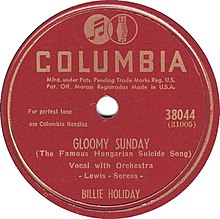
"Gloomy Sunday" (Hungarian: Szomorú Vasárnap), also known as the "Hungarian Suicide Song", is a popular song composed by Hungarian pianist and composer Rezső Seress and published in 1933.
The original lyrics were titled "Vége a világnak" (The world is ending) and were about despair caused by war, ending in a quiet prayer about people's sins. Poet László Jávor wrote his own lyrics to the song, titled Szomorú vasárnap (Sad Sunday), in which the protagonist wants to commit suicide following his lover's death.[1] The latter lyrics ended up becoming more popular while the former were essentially forgotten. The song was first recorded in Hungarian by pop singer Pál Kalmár in 1935.
"Gloomy Sunday" was first recorded in English by Hal Kemp in 1936, with lyrics by Sam M. Lewis,[2] and was recorded the same year by Paul Robeson, with lyrics by Desmond Carter. It became well known throughout much of the English-speaking world after the release of a version by jazz and swing music singer Billie Holiday in 1941. Lewis's lyrics refer to suicide, and the record label described it as the "Hungarian Suicide Song". There is a recurring urban legend which claims that many people have taken their own lives while listening to this song, particularly Hungarians.[3]
- ^ "Sheet music : Gloomy Sunday (442×694)". Mutablesound.com. Archived from the original (JPG) on 5 March 2016. Retrieved 26 July 2016.
- ^ "Gloomy Sunday - Sam M. Lewis Lyrics". Phespirit.info. Archived from the original on 21 January 2013. Retrieved 26 July 2016.
- ^ "Archived copy". Archived from the original on 25 April 2012. Retrieved 7 November 2011.
{{cite web}}: CS1 maint: archived copy as title (link)